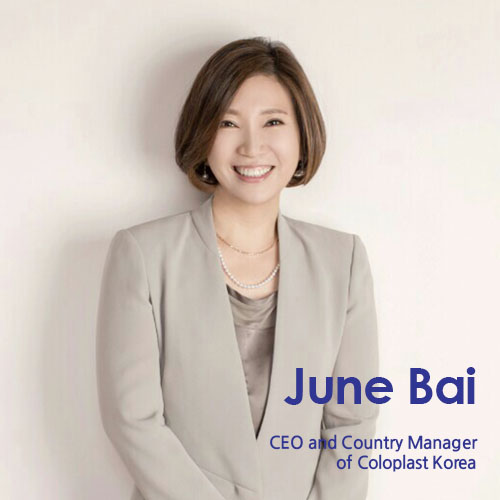CEOLeaders Invest Korea, KOTRA, “의료 제품을 통한 존엄성 및 자신감 회복”
페이지 정보

본문
Restoring Dignity and Confidence with Medical Products
With increasing government support and public awareness of the need for its products, Coloplast Korea has been seeing consistent growth
June Bai looks at corporate social responsibility a bit differently than most of us do. For instance, she recently saw an interview on television with a man with disabilities who had spent the afternoon making kimchi for the elderly. The man looked happy, beamed almost, that he had helped someone instead of being helped. “So I was thinking, all those people, we as good citizens have some responsibility to treat them fairly, make them happy just like us,” said Bai, the CEO and country manager of Coloplast Korea. “We need to make them happier.”
At Coloplast Korea, a medical device manufacturer based in Denmark, the key to helping people be happy is making sure they can live with dignity. Developing products and services for people with intimate and private medical conditions, the company focuses on ostomy care, urology and continence care and wound and skin care. Bai remembers hearing people with disabilities and special, intimate needs speak at a seminar last year.
“You know, they are losing it completely, dignity… They said, it’s ok to be sitting in a wheelchair, but let me take care of my basic needs,” said Bai. “I thought I had understood them, but when I heard their speeches, I realized.”
Coloplast opened a subsidiary in Korea in 2007, drawn to the country’s advanced healthcare industry, desire and need for high-quality products, strong economy and growing purchasing power. Another factor that played into the company’s investment decision was Korea’s appeal as a testbed market; products that do well with Korea’s discerning and early adopter consumers tend to succeed in other markets. Since opening its doors, Coloplast Korea’s business has seen consistent growth, with revenue last year jumping about 20 percent thanks to an increase in good employees and a change in business model that now involves more direct sales than a reliance on distributors.
Coloplast’s history goes back to 1954, when a nurse in Denmark developed the world’s first ostomy bag for her younger sister, who had an ostomy operation and stopped going out in public for fear her stoma would leak. The nurse created an ostomy bag with an adhesive ring that would fit tightly on the skin and help her sister live a normal life.
Today the company is a market leader in ostomy care, with 35-40 percent of the market share, but its wound care unit is the fastest growing. An important indicator of Coloplast Korea’s growth and success is the extent to which the Korean government reimburses its products, which means patients can pay less. About 90 percent of its ostomy care products is reimbursed while the majority of its wound care products is reimbursed and about 20 percent is covered in the continence care unit.
“The best win-win for us is to work with the government very closely and appeal to the government as to why our patients need high-quality products for their quality of life,” said Bai. “So we are constantly working with the government.” Support in this regard is also an acknowledgement by the government of the need for these products and a sign of growing awareness about them. “These are niche market products. Patients who have intimate needs are using our products and don’t want to let everyone know ‘I’m using this product,’” said Bai. “So even if it’s necessary to increase their quality of life, it’s been never discussed, never gotten attention from the key doctors.”
In addition to doing sales and marketing, Coloplast Korea staff also help educate medical professionals on issues related to ostomy, wound and continence care, providing information that sometimes isn’t readily available in Korea.With Asia being Coloplast’s second-largest growth contributor by region and the largest from an investment perspective, the company has plans to invest additionally in Korea, the second-largest revenue-generating country in Asia for Coloplast, after China. And while 65 percent of its total revenue now comes from the Seoul area, Coloplast Korea plans to expand its services in the country’s provinces.
"They are very dedicated to investing in Korea for our business growth here,” said Bai, about Coloplast headquarters. “And also, they are investing with new product launches.” Within a few years, Coloplast plans to localize its products for the Asian market, which reflects the growing importance of the region for the company. One of the ways Coloplast is helping patients handle their conditions with dignity is by developing medical products that don’t look like medical products. One of their catheters looks like a tube of mascara and could fit easily in an evening clutch. The aim is to create products that fight stigmas and help people feel confident.
Bai has found that while some consumers of Coloplast’s products are mountain climbers or former champion gymnasts who have injured themselves, 60 to 70 percent are those who have been in car accidents that have left them with disabilities. With the right products and services, they can go back to many of the activities they used to enjoy, which could help prevent depression and thoughts of suicide. “So we’d like to improve that not overnight, but maybe over the next three years, five years,” said Bai. “I think it’s social responsibility.”
By Esther Oh, Investment Public Relations Team, Invest Korea (estheroh@kotra.or.kr)
관련링크
- 이전글글로벌 시대의 여성 리더십 : 배금미 대표 한국외대 특강 1 24.02.22
- 다음글[한국경제] 배금미 콜로플라스트코리아 대표, '칼퇴' 독촉하는 리더…"워킹맘 늘면 일터도 행복" 24.02.20


